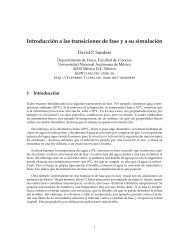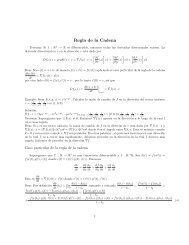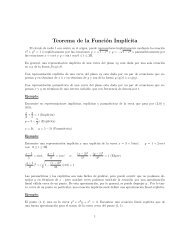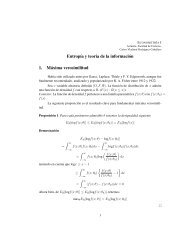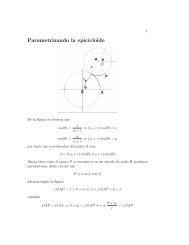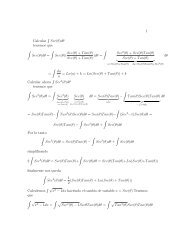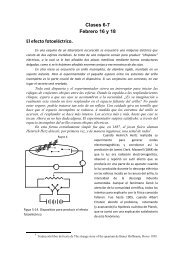"Surely You're Joking, Mr. Feynman!" - unam.
"Surely You're Joking, Mr. Feynman!" - unam.
"Surely You're Joking, Mr. Feynman!" - unam.
Create successful ePaper yourself
Turn your PDF publications into a flip-book with our unique Google optimized e-Paper software.
At all these places everybody working in physics would tell me what they were<br />
doing and I'd discuss it with them. They would tell me the general problem they were<br />
working on, and would begin to write a bunch of equations.<br />
"Wait a minute," I would say, "Is there a particular example of this general<br />
problem?"<br />
"Why yes; of course."<br />
"Good. Give me one example." That was for me: I can't understand anything in<br />
general unless I'm carrying along in my mind a specific example and watching it go.<br />
Some people think in the beginning that I'm kind of slow and I don't understand the<br />
problem, because I ask a lot of these "dumb" questions: "Is a cathode plus or minus? Is an<br />
an ion this way, or that way?"<br />
But later, when the guy's in the middle of a bunch of equations, he'll say<br />
something and I'll say, "Wait a minute! There's an error! That can't be right!"<br />
The guy looks at his equations, and sure enough, after a while, he finds the<br />
mistake and wonders, "How the hell did this guy, who hardly understood at the<br />
beginning, find that mistake in the mess of all these equations?"<br />
He thinks I'm following the steps mathematically, but that's not what I'm doing. I<br />
have the specific, physical example of what he's trying to analyze, and I know from<br />
instinct and experience the properties of the thing. So when the equation says it should<br />
behave soandso, and I know that's the wrong way around, I jump up and say, "Wait!<br />
There's a mistake!"<br />
So in Japan I couldn't understand or discuss anybody's work unless they could<br />
give me a physical example, and most of them couldn't find one. Of those who could, it<br />
was often a weak example, one which could be solved by a much simpler method of<br />
analysis.<br />
Since I was perpetually asking not for mathematical equations, but for physical<br />
circumstances of what they were trying to work out, my visit was summarized in a<br />
mimeographed paper circulated among the scientists (it was a modest but effective<br />
system of communication they had cooked up after the war) with the title, "<strong>Feynman</strong>'s<br />
Bombardments, and Our Reactions."<br />
After visiting a number of universities I spent some months at the Yukawa<br />
Institute in Kyoto. I really enjoyed working there. Everything was so nice: You'd come to<br />
work, take your shoes off, and someone would come and serve you tea in the morning<br />
when you felt like it. It was very pleasant.<br />
While in Kyoto I tried to learn Japanese with a vengeance. I worked much harder<br />
at it, and got to a point where I could go around in taxis and do things. I took lessons<br />
from a Japanese man every day for an hour.<br />
One day he was teaching me the word for "see."<br />
"All right," he said. "You want to say, 'May I see your garden?' What do you<br />
say?"<br />
I made up a sentence with the word that I had just learned.<br />
"No, no!" he said. "When you say to someone, 'Would you like to see my garden?<br />
you use the first 'see.' But when you want to see someone else's garden, you must use<br />
another 'see,' which is more polite."<br />
"Would you like to glance at my lousy garden?" is essentially what you're saying<br />
in the first case, but when you want to look at the other fella's garden, you have to say



